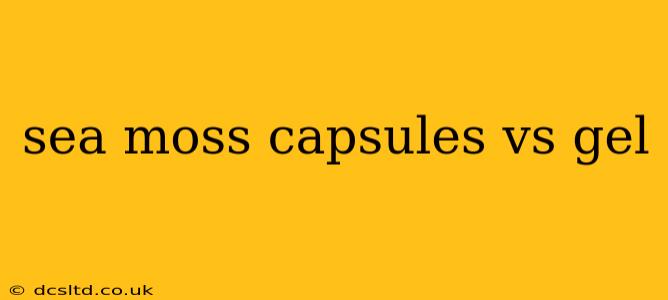Sea moss, a type of red seaweed, has gained popularity as a nutritional supplement, touted for its purported health benefits. It's rich in vitamins, minerals, and antioxidants. But when it comes to consuming sea moss, you have a choice: capsules or gel. This article explores the key differences between sea moss capsules and gel, helping you determine which form best suits your needs and preferences.
What are the Benefits of Sea Moss?
Before diving into the capsule vs. gel debate, let's briefly examine the potential benefits attributed to sea moss. It's important to note that while anecdotal evidence and some studies suggest benefits, more robust research is needed to confirm these claims. Sea moss is often associated with:
- Improved Immune Function: Its high mineral content, including zinc and iron, may support immune health.
- Increased Energy Levels: The vitamins and minerals in sea moss contribute to overall energy production.
- Better Skin Health: Some believe sea moss's antioxidants can promote healthier, clearer skin.
- Improved Gut Health: Its prebiotic properties might aid digestion and gut microbiome balance.
- Boosted Thyroid Function: Sea moss contains iodine, crucial for thyroid hormone production. However, it's vital to consult a doctor before using sea moss if you have thyroid issues, as excessive iodine can be harmful.
Sea Moss Capsules: Convenience and Portability
Sea moss capsules offer a convenient and portable way to incorporate sea moss into your daily routine. They're easy to swallow and ideal for those with busy schedules or who dislike the taste or texture of sea moss gel.
Pros of Sea Moss Capsules:
- Convenience: Simple to consume, anytime, anywhere.
- Portability: Easily carried in a bag or purse.
- No Taste or Texture: Eliminates the sometimes-unpleasant taste and texture of sea moss gel.
- Pre-measured Dosage: Provides consistent intake of sea moss.
Cons of Sea Moss Capsules:
- Lower Bioavailability: The encapsulation process may reduce the absorption of some nutrients compared to the gel.
- Potential Fillers: Some capsule formulations might contain fillers or additives. Look for capsules made with minimal ingredients.
- Cost: Capsules can be more expensive per serving than making sea moss gel at home.
Sea Moss Gel: Maximum Nutrient Absorption?
Sea moss gel involves soaking and blending the dried sea moss to create a gelatinous substance. Proponents suggest that consuming sea moss gel ensures better nutrient absorption compared to capsules.
Pros of Sea Moss Gel:
- Higher Bioavailability: Many believe the gel form offers superior nutrient absorption.
- Versatility: Sea moss gel can be added to smoothies, juices, or other foods and drinks.
- Cost-Effective: Making sea moss gel at home is generally cheaper than purchasing capsules.
- More Natural: Avoids potential additives or fillers found in some capsules.
Cons of Sea Moss Gel:
- Taste and Texture: The taste and slimy texture can be off-putting for some people.
- Preparation Time: Requires soaking and blending the sea moss, which takes time.
- Storage: Requires refrigeration after preparation.
How to Choose Between Sea Moss Capsules and Gel
The best choice depends on individual preferences and needs.
- Convenience is key: Choose capsules if ease of use and portability are your priorities.
- Maximize nutrient absorption: Opt for sea moss gel if maximizing nutrient absorption is your main concern.
- Taste and texture are important: Capsules are likely the better option if you are sensitive to taste and texture.
- Budget-conscious: Making sea moss gel at home is usually more economical.
What are the potential side effects of sea moss?
While generally considered safe for consumption, sea moss can potentially cause side effects in some individuals. These include digestive issues such as diarrhea or stomach upset, especially when consumed in large quantities. Also, as mentioned earlier, individuals with thyroid issues should exercise caution and consult their doctor before using sea moss due to its iodine content.
Is it safe to take sea moss daily?
Whether it's safe to consume sea moss daily depends on individual factors. While many people consume it daily without issues, it's always best to start with small amounts and monitor your body's response. Overconsumption could lead to digestive upset or other problems. Consulting your doctor before making sea moss a regular part of your diet is advisable, especially if you have pre-existing health conditions.
Which is better: organic or non-organic sea moss?
Organic sea moss is grown without the use of pesticides or herbicides, ensuring a cleaner product free from potentially harmful chemicals. However, non-organic sea moss might be readily available and more affordable. The choice between organic and non-organic depends on individual priorities and budget. If you prioritize purity and sustainability, organic sea moss is a better option.
Ultimately, the decision of whether to use sea moss capsules or gel is personal. Weigh the pros and cons of each, consider your individual needs and preferences, and consult with a healthcare professional if you have any concerns or pre-existing health conditions before incorporating sea moss into your diet.
